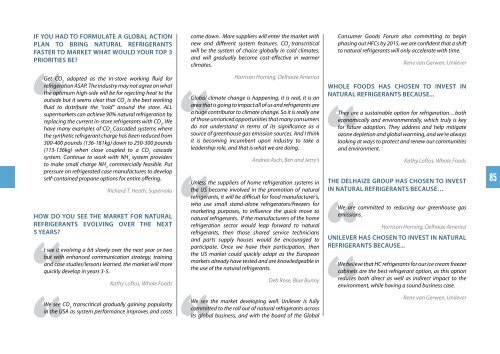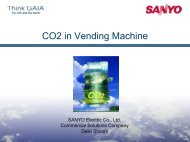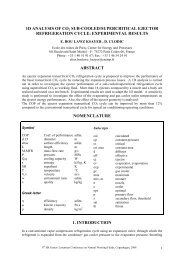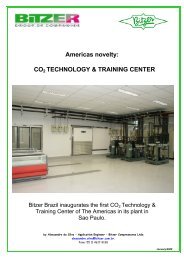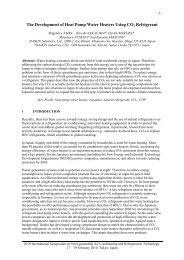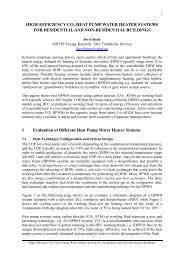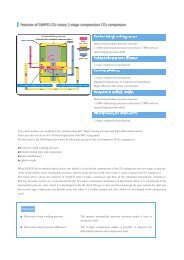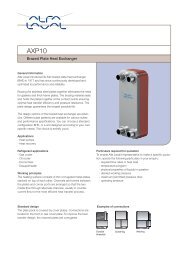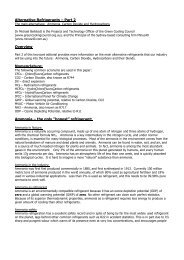TABLE OF CONTENTS - Everything R744
TABLE OF CONTENTS - Everything R744
TABLE OF CONTENTS - Everything R744
Create successful ePaper yourself
Turn your PDF publications into a flip-book with our unique Google optimized e-Paper software.
If you had to formulate a global action<br />
plan to bring natural refrigerants<br />
faster to market what would your top 3<br />
priorities be?<br />
come down. More suppliers will enter the market with<br />
new and different system features. CO 2<br />
transcritical<br />
will be the system of choice globally in cold climates,<br />
and will gradually become cost-effective in warmer<br />
climates.<br />
Consumer Goods Forum also committing to begin<br />
phasing out HFCs by 2015, we are confident that a shift<br />
to natural refrigerants will only accelerate with time.<br />
Rene van Gerwen, Unilever<br />
Get CO 2<br />
adopted as the in-store working fluid for<br />
refrigeration ASAP. The industry may not agree on what<br />
the optimum high-side will be for rejecting heat to the<br />
outside but it seems clear that CO 2<br />
is the best working<br />
fluid to distribute the “cold” around the store. ALL<br />
supermarkets can achieve 90% natural refrigeration by<br />
replacing the current in-store refrigerants with CO 2<br />
. We<br />
have many examples of CO 2<br />
Cascaded systems where<br />
the synthetic refrigerant charge has been reduced from<br />
300-400 pounds (136-181kg) down to 250-300 pounds<br />
(113-136kg) when close coupled to a CO 2<br />
cascade<br />
system. Continue to work with NH 3<br />
system providers<br />
to make small charge NH 3<br />
commercially feasible. Put<br />
pressure on refrigerated case manufactures to develop<br />
self-contained propane options for entire offering.<br />
Richard T. Heath, Supervalu<br />
How do you see the market for natural<br />
refrigerants evolving over the next<br />
5 years?<br />
I see it evolving a bit slowly over the next year or two<br />
but with enhanced communication strategy, training<br />
and case studies/lessons learned, the market will more<br />
quickly develop in years 3-5.<br />
Kathy Loftus, Whole Foods<br />
Harrison Horning, Delhaize America<br />
Global climate change is happening, it is real, it is an<br />
area that is going to impact all of us and refrigerants are<br />
a huge contributor to climate change. So it is really one<br />
of those unnoticed opportunities that many consumers<br />
do not understand in terms of its significance as a<br />
source of greenhouse gas emission sources. And I think<br />
it is becoming incumbent upon industry to take a<br />
leadership role, and that is what we are doing.<br />
Andrea Asch, Ben and Jerry’s<br />
Unless the suppliers of home refrigeration systems in<br />
the US become involved in the promotion of natural<br />
refrigerants, it will be difficult for food manufacturer’s,<br />
who use small stand-alone refrigerators/freezers for<br />
marketing purposes, to influence the quick move to<br />
natural refrigerants. If the manufacturers of the home<br />
refrigeration sector would leap forward to natural<br />
refrigerants, then those shared service technicians<br />
and parts supply houses would be encouraged to<br />
participate. Once we have their participation, then<br />
the US market could quickly adapt as the European<br />
markets already have tested and are knowledgeable in<br />
the use of the natural refrigerants.<br />
Deb Rose, Blue Bunny<br />
Whole Foods has chosen to invest in<br />
natural refrigerants because...<br />
They are a sustainable option for refrigeration…both<br />
economically and environmentally, which truly is key<br />
for future adoption. They address and help mitigate<br />
ozone depletion and global warming, and we’re always<br />
looking at ways to protect and renew our communities<br />
and environment.<br />
Kathy Loftus, Whole Foods<br />
The Delhaize Group has chosen to invest<br />
in natural refrigerants because…<br />
We are committed to reducing our greenhouse gas<br />
emissions.<br />
Harrison Horning, Delhaize America<br />
Unilever has chosen to invest in natural<br />
refrigerants because...<br />
We believe that HC refrigerants for our ice cream freezer<br />
cabinets are the best refrigerant option, as this option<br />
reduces both direct as well as indirect impact to the<br />
environment, while having a sound business case.<br />
85<br />
We see CO 2<br />
transcritical gradually gaining popularity<br />
in the USA as system performance improves and costs<br />
We see the market developing well. Unilever is fully<br />
committed to the roll out of natural refrigerants across<br />
its global business, and with the board of the Global<br />
Rene van Gerwen, Unilever


